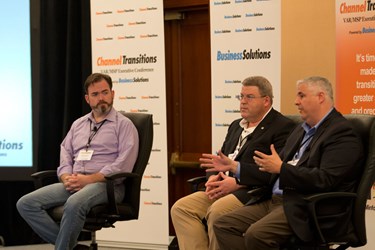Channel Transitions East: Panel Shares Candid Advice For MSPs


Channel Transitions VAR/MSP Executive Conferences powered by Business Solutions magazine — education and networking conferences designed to help VAR and managed services provider (MSP) executives learn how to best implement and manage the as-a-Service model — promise “real-world, nuts-and-bolts, headaches-and-heartaches discussions and success stories on the transition.”
At Channel Transitions East on July 22 at the Hilton Boston Logan Airport, panelists delivered on this promise with an hour of candid advice. Panelists for this event were Brian Doyle, VP of IT and data center services for PCNet, Thomas Clancy, co-founder of Valiant Technology, and Hunter Allen, CEO and president of Cervion Systems.
Takeaways from the panel discussion include:
Allen: When your business model changes, some of your staff will make the transition well. Others won’t, and you need to do what’s best for the company. “It’s not the people you fire. It’s the people you don’t fire.”
Doyle: When hiring technicians, “I look for personality first, then technical aptitude. I can teach them skills.”
Clancy: “My part of an interview is cultural. Tech aspects are secondary. I make sure they speak human first and technician second.”
Allen: When hiring a salesperson, “I look at prior performance. Tell me — then show me a W-2.”
Doyle: During an interview with a candidate for a sales position ask, “Is he doing his best sales job during this interview?” He says he uses personality tests in addition to the interview and other metrics to decide on a new employee.
Clancy: When he brought in a new sales representative, he used a “bridge” to help compensate him in the beginning, based on an estimate of what his future income would be. “It’s for recruiting. Good salespeople aren’t out of work, so to get them to work for you, you don’t want them to take a pay cut to start.”
Doyle: If you need to change a compensation structure, know salespeople know plans can change — but it’s easier to manage when they can see how the new plan will provide benefits to them.
Doyle: One mistake when compensating sales reps is to try to base it on margins. If you expose the margin “they could cherry pick what they want to sell and not sell a total solution.”
Allen: We compensate sales reps by heavily loading up front with residuals over time coming to the business. “If a person is making $10,000 in a certain month from residuals, they might not be motivated to sell to new customers.”
Clancy: Valiant holds Friday afternoon training sessions on technology and business topics. Staff members train their teams. “If they don’t pick a topic it gets assigned … If they display a gap in knowledge they will get assigned that.”
Clancy: When you add a service to an existing contract, consider “co-termination.” Extend the ongoing service to match the timeframe of the news service. “You just bought yourself six more months of that relationship without lifting a finger.”
Doyle: With expectations among customers that service would be available 24/7, he developed that by first outsourcing the network operations center (NOC) after hours until his staff could manage the round-the-clock schedule in house.
Allen: To overcome customer objections, “sell peace of mind with a constant expense factor.” Compare it to insurance — that they will actually use.
Clancy: Be selective when you take on a new client. “When you are overstaffed, you will take every customer that comes in the door. When you aren’t, you don’t need them.” If you have a customer that is difficult to work with, “fire them.” Without the stress of that customer, you and your staff will be happier, and ultimately, more successful.
Allen: Fire difficult customers. “Your staff will respect you. There’s no reason not to do it.”
Doyle: If you’re staying in the relationship for the revenue, fire them. You will find the revenue somewhere else.
Clancy: “Hire a coach. Work with someone not emotionally involved with your business. Everyone should have a coach.”
Allen: A parting bit of advice: understand your goal and drive to the goal.
For more information on upcoming Channel Transitions VAR/MSP Executive Conferences that focus on helping VARs transitioning from break/fix to the as-a-Service business model, visit www.BSMinfo.com/go/ChannelTransitions.
Channel Transitions is sponsored by: Platinum Sponsors GFI MAX and Mercury, Gold Sponsors F-Secure, RapidFire Tools, and Webroot, along with industry association partners CompTIA, The ASCII Group, and the Retail Solutions Providers Association (RSPA).
